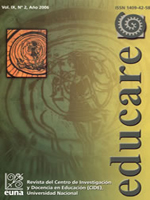Estrategias metodológicas para la interpretación y el análisis de la obra literaria El Ingenioso Hidalgo Don Quijote de la Mancha
DOI:
https://doi.org/10.15359/ree.9-2.7Keywords:
literary reading, constructionism, multiple intelligences, innovation, methodologyAbstract
This methodological proposal came up from an investigative study that was done with high school teachers in the subject of Spanish with the objective of knowing the methodological strategies that are used in the classroom space to comprehend and analize the literary work of El Ingenioso Hidalgo Don Quijote de la Mancha.
The objectives that were established were the following:
To identify the techniques and instruments that the Spanish teachers developed to study the literary work of El Ingenioso Hidalgo Don Quijote de la Mancha.
- To know the methodology that is used by Spanish teachers to developed the literary work of El Ingenioso Hidalgo Don Quijote de la Mancha.
- To propose a didactic unit to develop the multiple intelligencies in the literary study of the literary work of El Ingenioso Hidalgo Don Quijote de la Mancha.
After analyzing the data, a series of methodological strategies to interpret and analyse the novel El Ingenioso Hidalgo Don Quijote de la Mancha, wich contributes to improve the teaching and learning process in the Spanish subject, in particular, to change the negative perception that the students have about reading the masterpiece of Miguel de Cervantes.
References
Alvarado de Varilly, Jesusita. (1995). El proceso de evaluación de los aprendizajes. San José: Editorial Universidad Estatal a Distancia.
Antunes, Celso. (1998). Estimular las Inteligencias Múltiples. Madrid: Ediciones Narcea, S.A.
Avolio de Cols, Susana. (1970). Planeamiento y evaluación de la tarea escolar. Buenos Aires: Ediciones Troquel.
Barrantes Echavarría, Rodrigo. (1999). Investigación: un camino al conocimiento, un enfoque cualitativo y cuantitativo. San José: Editorial Universidad Estatal a Distancia.
Brenes Espinoza, Fernando. ( 1987). Evaluación diagnóstica, fonnativa y sumativa de los aprendizajes. San José: Editorial Universidad Estatal a Distancia.
Coll, César. (1992). Psicología y currículo. España: Ediciones Paidós.
Díaz Artavia, Francisco y otros. (1998). El enfoque de enseñanza-aprendizaje utilizado por los profesores de Estudios Sociales en la Región Educativa de Puriscal. Proyecto de graduación presentado para optar al grado de Licenciatura en Ciencias de la Educación con énfasis en Educación Cívica. UNED.
Gutiérrez, Francisco. (1996). Pedagogía y Pedagogismo. San José: Editorial La Nación.
Hernández, R.; Fernández, G. y Baptista, P. (1997). Metodología de la investigación. México, D.F.: Impresora OFGLOMA.
Lafourcade, Pedro. (1970). Evaluación de los aprendizajes. Buenos Aires: Editorial Kapelusz, S.A.
López, Olimpia. (1996). ¿Educación para el mercado o la vida? San José: Editorial La Nación.
Ministerio de Educación Pública. (1995). Marco de referencia y directrices técnicas para la evaluación en el sistema de evaluación fonnal. Nonnas básicas reguladoras del proceso educativo. Consejo Superior de Educación, febrero.
Ministerio de Educación Pública. (1994). División de Desarrollo Curricular. Programa de Mejoramiento de la calidad de la educación. Componente de evaluación. Evaluación de los Aprendizajes. San José, Costa Rica.
Ministerio de Educación Pública. (1994). Política educativa hacia el siglo XXI. Consejo Superior de Educación. Despacho del Ministro. San José.
Ministerio de Educación Pública. (1997). Programa de mejoramiento de la calidad de la educación general básica. Componente de adecuación curricular. Estrategias para evaluar el trabajo cotidiano. Departamento de Evaluación Educativo.
Minsky, Larissa. (2000). Revista Dominical: Mentes Fértiles. Pp. 6-26. San José: Editorial La Nación.
Molina, Zaida. (1997). Planeamiento didáctico: fundamentos, principios, estrategias y procedimientos para su desarrollo. Pp. 108-125.
Seas Tencio, Jenny. (1997). Guía de estudio. Evaluación de los aprendizajes. San José, Costa Rica: Editorial Universidad Estatal a Distancia.
Sierra, C. (1989). Técnicas de investigación social: teoría y ejercicios. Madrid, España: Editorial Paninfo.
Torres Faúaz, Ana Cecilia. (1995). Artículo: Investigación cualitativa.
Torres Faúaz, Ana Cecilia. ( 1995). Artículo: Investigación participativa.
Verlee, Linda. Aprender con todo el cerebro. Berkeley : Editorial Martínez Roca.
Downloads
Published
How to Cite
Issue
Section
License
1. In case the submitted paper is accepted for publication, the author(s) FREELY, COSTLESS, EXCLUSIVELY AND FOR AN INDEFINITE TERM transfer copyrights and patrimonial rights to Universidad Nacional (UNA, Costa Rica). For more details check the Originality Statement and Copyright Transfer Agreement
2. REUTILIZATION RIGHTS: UNA authorizes authors to use, for any purpose (among them selfarchiving or autoarchiving) and to publish in the Internet in any electronic site, the paper´'s final version, both approved and published (post print), as long as it is done with a non commercial purpose, does not generate derivates without previous consentment and recognizes both publisher's name and authorship.
3. The submission and possible publication of the paper in the Educare Electronic Journal is ruled by the Journal’s editorial policies, the institutional rules of Universidad Nacional and the laws of the Republic of Costa Rica. Additionally, any possible difference of opinion or future dispute shall be settled in accordance with the mechanisms of Alternative Dispute Resolution and the Costa Rican Jurisdiction.
4. In all cases, it is understood that the opinions issued are those of the authors and do not necessarily reflect the position and opinion of Educare, CIDE or Universidad Nacional, Costa Rica. It is also understood that, in the exercise of academic freedom, the authors have carried out a rogorous scientific-academic process of research, reflection and argumentation thar lays within the thematic scope of interest of the Journal.
5. The papers published by Educare Electronic Journal use a Creative Commons License:














 The articles published by Educare Electronic Journal can be shared with a Creative Commons License:
The articles published by Educare Electronic Journal can be shared with a Creative Commons License: 



